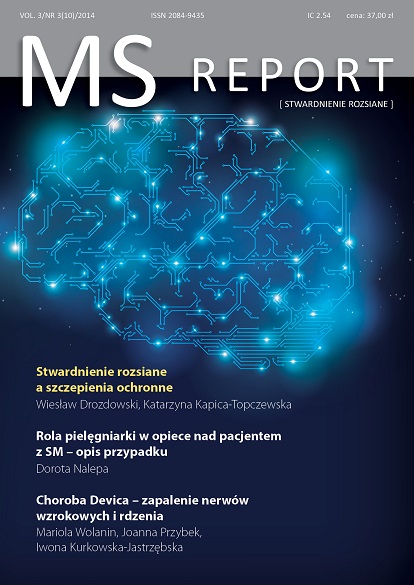Stwardnienie rozsiane a szczepienia ochronne Artykuł przeglądowy
##plugins.themes.bootstrap3.article.main##
Abstrakt
Związki między stwardnieniem rozsianym (SM, sclerosis multiplex) a szczepieniami ochronnymi są wielokierunkowe i nie do końca jednoznacznie ustalone. Z jednej strony, stosowanie w przebiegu SM szczepień zmniejsza ryzyko nabytych chorób infekcyjnych, mogących wyzwalać rzuty SM. Z drugiej strony, szczepienia – poprzez stymulację układu immunologicznego – mogą prowadzić do zaostrzeń SM.
Przedstawiona analiza piśmiennictwa wykazuje, że szczepienia przeciw gruźlicy, grypie, wirusowemu zapaleniu wątroby typu B, chorobie Heinego-Medina, odrze, śwince, różyczce i durowi brzusznemu nie zwiększają ryzyka rozwoju SM. Ponadto stwierdzono mniejsze ryzyko rozwoju SM u osób szczepionych przeciw błonicy i tężcowi.
Innym zagadnieniem, również nie do końca poznanym, jest skuteczność szczepień u pacjentów ze stwardnieniem rozsianym leczonych (coraz powszechniej) różnymi lekami immunomodulującymi. Terapia immunomodulująca ma, w świetle piśmiennictwa, zróżnicowany wpływ na skuteczność szczepień i wymagane są dalsze badania. Dotychczasowe prace wykazują, że pacjenci z SM po szczepionkach przeciw grypie uzyskują właściwy poziom odpowiedzi immunologicznej w trakcie leczenia immunomodulującego interferonem β (IFN-β) oraz teryflunomidem. Natomiast leczenie octanem glatirameru, natalizumabem i mitoksantronem może zmniejszać skuteczność szczepień przeciwko grypie, co wymaga kolejnych dużych badań populacyjnych. Badania takie są konieczne również w odniesieniu do innych szczepień.
##plugins.themes.bootstrap3.article.details##
Copyright © by Medical Education. All rights reserved.
Bibliografia
2. Confavreux C., Suissa S., Saddier P. et al.: Vaccines in Multiple Sclerosis Study Group. Vaccinations and the risk of relapse in multiple sclerosis. Vaccines in Multiple Sclerosis Study Group. NEJM 2001; 344: 319-326.
3. Farez M.F., Correale J.: Yellow fever vaccination and increased relapse rate in travelers with multiple sclerosis. Arch. Neurol. 2011; 68: 1267-1271.
4. Farez M.F., Correale J.: Immunizations and risk of multiple sclerosis: systematic review and meta-analysis. J. Neurol. 2011; 258: 1197-11206.
5. Farez M.F., Ysrraelit M.C., Fiol M. et al.: H1N1 vaccination does not increase risk of relapse in multiple sclerosis: a self-controlled case-series study. Mult. Scler. 2012; 18: 254-256.
6. The American Academy of Neurology & The Immunization Panel of the Multiple Sclerosis Council for Clinical Practice Guidelines, 2013 [online: www.nationalmssociety.org].
7. Schwid S.R., Decker M.D., Lopez-Bresnahan M.: Rebif Influenza Vaccine study Investigators Immune response to influenza vaccine is maintained in patients with multiple sclerosis receiving interferon beta-1a. Neurology 2005; 65: 1964-1966.
8. Bar-Or A., Freedman M.S., Kremenchutzky M. et al.: Teriflunomide effect on immune response to influenza vaccine in patients with multiple sclerosis. Neurology 2013; 81: 552-558.
9. Kappos L., Arroyo R., Izquierdoet G. et al.: A controlled study on the effect of fingolimod (FTY720) on the immune response following seasonal influenza vaccination and tetanus toxoid booster injection in patients with multiple sclerosis. Mult. Scler. J. 2011; 17: 126.
10. Olberg H., Cox R., Nostbakken J. et al.: Immunotherapies influence the influenza vaccination response in multiple sclerosis patients: an explorative study. Mult. Scler. 2014; 20: 1081-1085.

